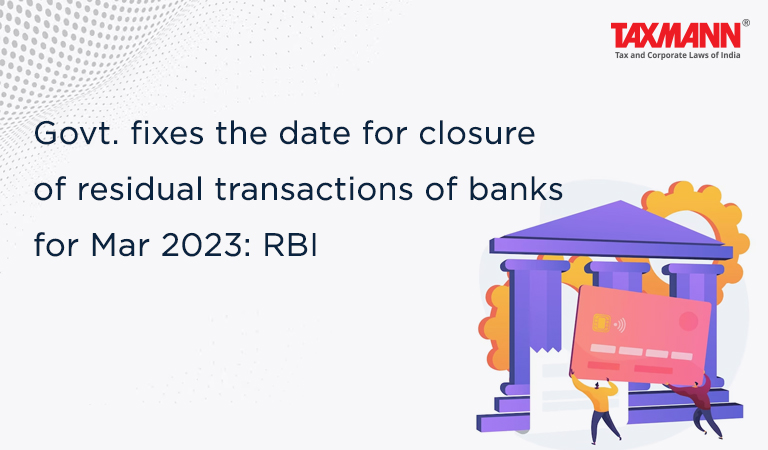Govt. fixes the date for closure of residual transactions of banks for Mar 2023: RBI
- Blog|News|FEMA & Banking|
- 2 Min Read
- By Taxmann
- |
- Last Updated on 18 March, 2023

Circular no. RBI/2022-23/184 DGBA.GBD.No.S1469/42-01-029/2022-2023, Dated 16.03.2023
Earlier, RBI vide circular no. dated February 24, 2022 advised the procedure to be followed for reporting and accounting of Central Government transactions ((including CBDT, CBIC, Departmentalized Ministries and Non-Civil Ministries) at the Receiving/Nodal/Focal Point branches of bank for the financial year 2021-22.
Now, the Central Government has decided that the closure date of residual transactions for the month of March 2023 be fixed as April 10, 2023.
In view of the ensuing closing of Government accounts for the financial year 2022-23, receiving branches including those not situated locally, should adopt special arrangements such as courier service etc, for passing on challans/scrolls, etc, to the Nodal/Focal Point branches so that all payments & collections made towards March end are accounted for in the same financial year. These instructions regarding special messenger arrangements may please be informed to all branches concerned.
Further, the RBI stated that as regards reporting of March 2023 transactions by Nodal/Focal Point branches in April 2023, the branches may be advised to follow the procedure as outlined in an annexure to the circular.
Further, the RBI clarified that the Nodal/Focal Point branches will be required to prepare a separate set of scrolls, one pertaining to March 2023 residual transactions and another for April transactions during the first 10 days of April 2023.
The Nodal/Focal Point branches should also ensure that the accounts for all transactions are effected at the receiving branches up to March 31, 2023 in the accounts for the current financial year itself and are not mixed up with the transactions of April 2023.
Also, while reporting transactions pertaining to March 2023 up to April 10, 2023, the transactions of April 2023 should not be mixed up with the residual transactions relating to March 2023.
Click Here To Read The Full Circular
Disclaimer: The content/information published on the website is only for general information of the user and shall not be construed as legal advice. While the Taxmann has exercised reasonable efforts to ensure the veracity of information/content published, Taxmann shall be under no liability in any manner whatsoever for incorrect information, if any.

Taxmann Publications has a dedicated in-house Research & Editorial Team. This team consists of a team of Chartered Accountants, Company Secretaries, and Lawyers. This team works under the guidance and supervision of editor-in-chief Mr Rakesh Bhargava.
The Research and Editorial Team is responsible for developing reliable and accurate content for the readers. The team follows the six-sigma approach to achieve the benchmark of zero error in its publications and research platforms. The team ensures that the following publication guidelines are thoroughly followed while developing the content:
- The statutory material is obtained only from the authorized and reliable sources
- All the latest developments in the judicial and legislative fields are covered
- Prepare the analytical write-ups on current, controversial, and important issues to help the readers to understand the concept and its implications
- Every content published by Taxmann is complete, accurate and lucid
- All evidence-based statements are supported with proper reference to Section, Circular No., Notification No. or citations
- The golden rules of grammar, style and consistency are thoroughly followed
- Font and size that’s easy to read and remain consistent across all imprint and digital publications are applied



 CA | CS | CMA
CA | CS | CMA
